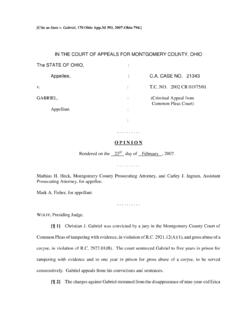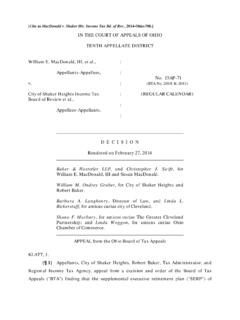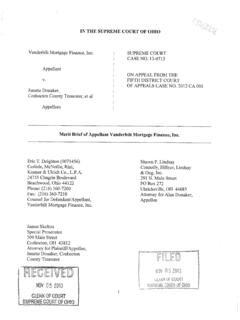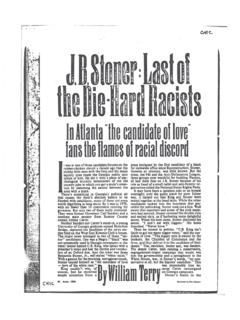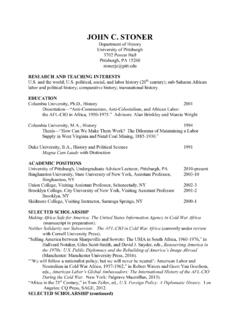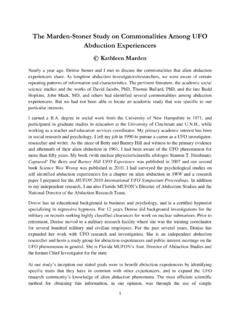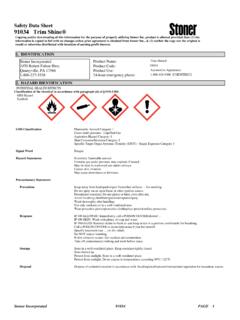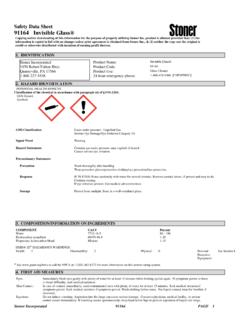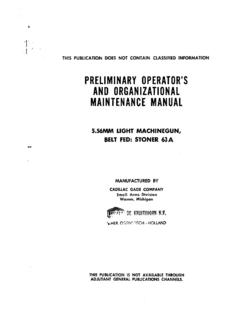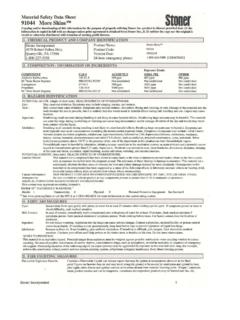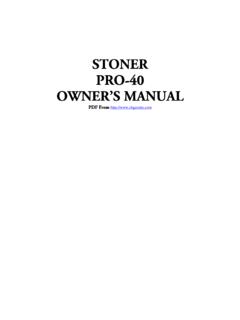Transcription of Stoner v. Salon Lofts, L.L.C. - sconet.state.oh.us
1 [Cite as Stoner v. Salon Lofts, , 2012-Ohio-3269.]. IN THE COURT OF APPEALS OF OHIO. TENTH APPELLATE DISTRICT. Sean A. Stoner , : Plaintiff-Appellant, : v. : No. 11AP-838. ( No. 10 CVH-09-13904). Salon Lofts, LLC et al., : (REGULAR CALENDAR). Defendants-Appellees. : D E C I S I O N. Rendered on July 19, 2012. Cooper & Elliott, LLC, Charles H. Cooper, Jr., Rex H. Elliott and Adam P. Richards, for appellant. Littler Mendelson, Thomas Metzger and Brooke E. Niedecken, for appellees. APPEAL from the Franklin County Court of Common Pleas TYACK, J. { 1} Sean A. Stoner is appealing from the preliminary injunction granted against him on behalf of his former employer, Salon Lofts, LLC (" Salon Lofts") and a related entity Salon Lofts Franchising, LLC (" Salon Lofts Franchising").
2 He assigns two errors for our consideration: [I.] The trial court erred in granting Salon Lofts Franchising, LLC's request for a preliminary injunction. [II.] The trial court erred by arbitrarily setting a surety bond in an amount not supported by the record. No. 11AP-838 2. { 2} Sean A. Stoner is an attorney working in the state of Ohio under a corporate From 2007 until 2010, he was general counsel and vice president of investor relations for Salon Lofts. Salon Lofts is in the business of leasing property to individuals in the hair and beauty industry to enable those individuals to operate their own businesses. Daniel Sadd, the owner of Salon Lofts, terminated Stoner 's employment with Salon Lofts on August 24, 2010.
3 On September 22, 2010, Stoner filed suit against his former employer and against Salon Lofts Franchising. { 3} The named defendants pursued a counterclaim in which they alleged that Stoner was violating the provisions of a covenant not to compete and was utilizing trade secrets he had acquired while employed by Salon Lofts. Salon Lofts and Salon Lofts Franchising requested injunctive relief against Stoner . { 4} The trial court conducted an evidentiary hearing, following which the judge assigned to the case granted the motion for a preliminary injunction in an entry journalized September 23, 2011. Stoner filed a notice of appeal to contest the terms of the preliminary injunction less than a week later.
4 { 5} Counsel for Stoner makes several arguments as to why a preliminary injunction on behalf of Salon Lofts Franchising was and is inappropriate. Stated briefly, counsel argues that the preliminary injunction is too broad; that a contractual agreement between Stoner and Salon Lofts Franchising is unenforceable; that the agreement is, at least in part, unenforceable specifically because part of it is contrary to public policy and Ohio law; that disclosure of trade secrets has not been proven by clear and convincing evidence; and that Salon Lofts Franchising failed to prove irreparable harm by clear and convincing evidence. { 6} Counsel for Stoner has also argued that, even if a preliminary injunction was and is appropriate, the bond of $95,000 does not come close to covering Stoner 's potential losses if the injunction is overturned.
5 { 7} We will address each of counsel's arguments below. { 8} The interpretation of a written contract is a matter of law, and as such is reviewed without deference to the trial court's determination. Alexander v. Buckeye 1 Corporate status is available to attorneys not admitted to practice law in Ohio who are employed full-time by a non-governmental Ohio employer. See R. VI, Sec. 3. No. 11AP-838 3. Pipe Line Co., 53 Ohio 241 (1978), paragraph one of the syllabus. The goal of construing contract language is to effectuate the parties' intent. "The intent of the parties to a contract is presumed to reside in the language they chose to employ in the agreement." Kelly v. Med. Life Ins. Co., 31 Ohio 130 (1987), paragraph one of the syllabus.
6 Additionally, when the parties' agreement is integrated into an unambiguous, written contract, courts should give effect to the plain meaning of the parties' expressed intentions. Aultman Hosp. Assn. v. Community Mut. Ins. Co., 46 Ohio 51 (1989), syllabus. The interpretation of a written agreement is a matter of law for the court. If a contract is clear and unambiguous, the court must give effect to the agreement's express terms and it need not go beyond the plain language of the agreement to determine the rights and obligations of the parties. { 9} However, the issuance of an injunction lies within the trial court's sound discretion and depends on the facts and circumstances surrounding the particular case.
7 LCD Videography, v. Finomore, 11th Dist. No. 2009-L-147, 2010-Ohio-6571, 53, citing Perkins v. Village of Quaker City, 165 Ohio St. 120 (1956), syllabus. Thus, our standard of review for the trial court's factual determinations is whether there was an abuse of discretion. { 10} As additional factual background, Stoner not only served as an in-house counsel for Salon Lofts, but also sought and became the first franchisee with Salon Lofts Franchising. Specifically, he and a partner, Jeffrey Wilkins, entered into an Agreement of Owners of Franchise in order to pursue the development of opportunities in the area of Charlotte, North Carolina. { 11} As general counsel for Salon Lofts before Salon Lofts Franchising came into existence, Stoner was heavily involved in creating the new company and the various documents used by the new company when it signed up franchisees.
8 One of those documents was the Agreement of Owners of Franchise, which Stoner signed in an individual capacity and upon which the trial court specifically relied in granting the preliminary injunction. The Agreement of Owners of Franchise contained a restrictive covenant Salon Lofts and Salon Lofts Franchising sought to enforce. { 12} In pertinent part, the agreement provides as follows: No. 11AP-838 4. Confidentiality and Non-Competition Each of you agrees that during the period that Franchisee owns one or more Salon Lofts stores or holds any rights to develop one or more such stores, and for a period of two years following the last date upon which Franchisee owns any such stores or holds the rights to develop any such stores, notwithstanding the reason for the termination of ownership (the "Restricted Period"), within a twenty (20) mile radius of any stores [sic] that was owned or operated, or in which Franchisee had any interest, or any location which Franchisee had the right to develop stores, you shall not, engage in the following activities.
9 (i) directly or indirectly enter into the employ of, render any service to, consult with or act in concert with any person, partnership, limited liability company, corporation or other entity of any kind, that owns, operates, manages, franchises, leases property to or licenses any business which offers the services of beauty enhancement professionals, including, but not limited to professionals such as hair stylists, aestheticians, nail technicians and massage therapists or similar ("Competitive Business") unless such Competitive Business is operated pursuant to a written license or other agreement with Salon Lofts. (ii) directly or indirectly engage in any such Competitive Business on your own account; or (iii) become interested in any such Competitive Business directly or indirectly as an individual, partner, member, shareholder, director, officer, principal, agent, employee, consultant, contributor of venture capital, guarantor, or in any other capacity or relationship.
10 { 13} The record on appeal shows that Stoner fully intended to develop businesses like those owned and operated by Salon Lofts both before he executed the franchise document and after his time as general counsel for Salon Lofts ended. Counsel for Stoner does not argue otherwise. Instead, counsel for Stoner asserts that the agreement executed by Stoner in his individual capacity is not enforceable. This returns us to the issues for review on appeal set forth in appellant's brief and summarized above. No. 11AP-838 5. { 14} Stoner 's assertion that the preliminary injunction is too broad has no merit. A restrictive covenant must satisfy three requirements to be enforceable: (1) the covenant must relate to either a contract for the sale of goodwill or other subject property or to a contract for employment; (2) the covenant must be supported by adequate consideration; and (3) the application of the covenant must be reasonably limited in both time and territory.

